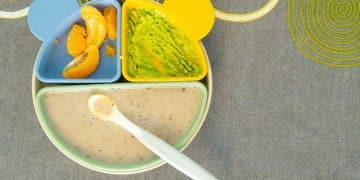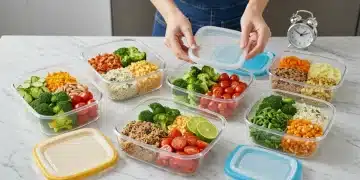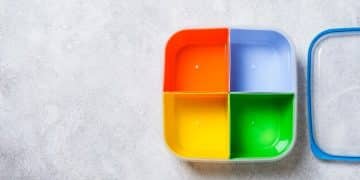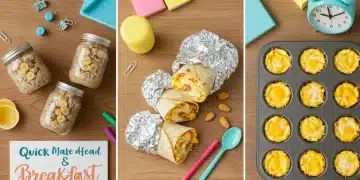Homemade baby food freezer meal plans that save time

Homemade baby food freezer meal plans allow parents to prepare nutritious meals in advance, using simple recipes and proper storage techniques for convenience and variety.
When it comes to feeding your little one, homemade baby food freezer meal plans can be a game changer. Not only do they save time, but they also ensure you’re providing nutritious and tasty meals for your baby. Let’s dive into how you can simplify meal prep with these tips!
Benefits of homemade baby food
When thinking about feeding your baby, the benefits of homemade baby food are significant. Not only does it give you complete control over the ingredients, but it also ensures that your child gets the freshest and healthiest meals possible. Making baby food at home can be a fun and rewarding experience, especially when you see your baby enjoying the wholesome flavors.
Healthier Ingredients
One of the greatest advantages of homemade baby food is the ability to choose the ingredients. You can select organic fruits and vegetables, avoiding preservatives and additives commonly found in commercial products. This ensures your baby is getting the best nutrients and flavors.
Cost-Effective
Making your own baby food can also save you money. Buying fruits and veggies in bulk is often cheaper than purchasing pre-packaged baby food. Additionally, you can use leftovers from your own meals, reducing waste and maximizing the value of your grocery shopping.
Customization
Every baby is unique, and their tastes can vary. With homemade baby food, you can easily customize flavors and textures. You can make purees, chunky mixtures, or even blends of your baby’s favorite foods. This level of customization isn’t often available with store-bought options.
Simple Preparation
Preparing homemade baby food is generally straightforward. With just a blender or food processor, you can create meals in minutes. Here are a few simple steps to prepare baby food:
- Select fresh ingredients.
- Cook if necessary (steaming is a great option).
- Blend to desired consistency.
- Store in jars or freezer bags.
Cleaning up is also quick. Many of the tools used can go right into the dishwasher, making the process convenient.
In summary, the benefits of homemade baby food are numerous. From ensuring freshness and nutrition to the ability to customize flavors and save money, it’s an option well worth considering for any parent. Providing your baby with these healthy choices sets a strong foundation for their future eating habits.
Essential ingredients for baby food prep
When preparing homemade baby food, knowing the essential ingredients for baby food prep is crucial. This ensures that your little one gets the best nutrition right from their first bites. The right ingredients can make a big difference in taste and health.
Fruits
Choosing the right fruits is fundamental. Opt for fresh and organic fruits whenever possible. Common choices include:
- Bananas
- Apples
- Pears
- Avocados
These fruits are not only delicious but also packed with vitamins and minerals that support your baby’s growth.
Vegetables
Vegetables are equally important in baby food preparation. They offer essential nutrients and can introduce your baby to different flavors. Some excellent options are:
- Carrots
- Sweet potatoes
- Peas
- Squash
When cooking vegetables, steaming is a great method as it helps retain the nutrients while making them soft enough for your baby.
Grains
Including grains in your baby’s diet can provide energy and fiber. Consider introducing:
- Brown rice
- Oatmeal
- Barley
- Quinoa
These grains can be easily blended with fruits or vegetables to create balanced meals.
Don’t forget about protein sources! Foods like lentils and beans are great options for adding healthy protein. Additionally, you can use water, breast milk, or formula to achieve the desired consistency.
With these essential ingredients for baby food prep, you can create a variety of nutritious meals that help your baby develop a taste for healthy foods. The key is to keep experimenting with different combinations to find out what your baby enjoys the most.
Freezer storage tips for baby food

Knowing the right freezer storage tips for baby food can make meal prep much easier and more efficient. Proper storage ensures that your homemade baby food stays fresh and nutritious while saving time for busy parents.
Use the Right Containers
Choosing the right storage containers is essential. Glass jars, silicone molds, and BPA-free plastic containers work well for this purpose. Make sure to:
- Seal containers tightly to prevent freezer burn.
- Label each container with the date and type of food.
- Avoid using regular plastic bags for prolonged storage.
Using suitable containers helps maintain quality and allows for easy organization in your freezer.
Portion Control
Portioning baby food is a great way to ensure you’re serving the right amount at each meal. Consider these tips:
- Freeze small amounts (1-2 ounces) for single servings.
- Use ice cube trays for easy portioning.
- Once frozen, transfer cubes to a labeled bag.
This method also helps reduce food waste and makes it easy to thaw only what you need.
Freezing Guidelines
When it comes to freezing baby food, following some simple guidelines is beneficial. Always:
- Let food cool completely before freezing.
- Avoid refreezing thawed baby food to maintain quality.
- Freeze food within 24 hours of preparation for the best results.
By adhering to these guidelines, you can keep the food fresh and safe for your baby.
In addition, remember that most homemade baby food can be stored in the freezer for up to three months. After that, the quality may start to decline. If you’re unsure about a particular food, trust your senses – if it smells off or has changed in color, it’s better to throw it away.
Implementing these freezer storage tips for baby food allows you to prepare nutritious meals in advance without compromising quality, simplifying your meal prep routine.
Quick recipes for homemade baby food
Creating quick recipes for homemade baby food is a simple and enjoyable way to ensure your baby gets nutritious meals. With just a few ingredients and some creativity, you can whip up healthy dishes in no time.
Banana and Avocado Mash
This recipe is rich in healthy fats and easy to prepare. Simply:
- Take one ripe banana and one ripe avocado.
- Peel and mash both ingredients together until smooth.
- Serve immediately or store in the fridge for up to one day.
This mash is not only creamy but also packed with nutrients for your little one.
Sweet Potato Puree
Sweet potatoes are sweet and nutritious, making them a perfect first food. To make a quick puree:
- Peel and chop one medium sweet potato into small cubes.
- Steam the cubes for about 15 minutes, or until tender.
- Blend with a little water or breast milk until smooth.
This puree can be stored in the freezer in portions, allowing for easy meal prep.
Carrot and Pea Blend
This colorful recipe is packed with vitamins. Here’s how to prepare it:
- Steam one cup of chopped carrots and half a cup of peas until soft.
- Blend together, adding water to reach the desired consistency.
- Serve fresh or freeze in small portions.
Your baby will love the bright color and sweet flavor of this dish.
With these quick recipes for homemade baby food, you can prepare healthy meals in less time. Remember to introduce new foods gradually and monitor your baby for any allergic reactions. Have fun experimenting with different ingredients and flavors!
Meal planning strategies for parents
Meal planning can be a game changer for parents looking to provide nutritious food while saving time. Using effective meal planning strategies for parents can simplify your daily routine and ensure your baby always has wholesome meals ready to enjoy.
Weekly Planning
Setting aside time each week to plan meals is crucial. Start by choosing a day to sit down and outline your baby’s meals for the week. Consider including:
- Variety to keep your baby interested.
- Seasonal ingredients that are fresh and often less expensive.
- Cooking larger batches to save time later.
This approach helps streamline grocery shopping and meal preparation.
Shopping List
Creating a shopping list based on your meal plan is essential for staying organized. A good list should contain:
- Specific ingredients based on your planned recipes.
- Quantities needed to reduce food waste.
- Staying flexible to accommodate new or on-sale items.
Having a list keeps you focused while shopping and minimizes impulse buys.
Meal Prep Sessions
Setting aside time for meal prep can save precious minutes during busy weekdays. Here are a few tips:
- Prepare food in bulk, such as pureeing several batches of fruits and vegetables at once.
- Portion meals into containers for easy access later on.
- Label and date your containers to keep track of what needs to be used first.
This method allows you to simply grab a meal and heat it when needed.
Incorporating these meal planning strategies for parents into your routine makes feeding your baby much easier. With organization and preparation, you can enjoy more time with your little one while ensuring they receive healthy, tasty meals.
FAQ – Frequently Asked Questions about Homemade Baby Food
What is the best way to store homemade baby food?
Using airtight containers is key. Glass jars and BPA-free plastic containers are great options, and always label them with the date.
How long can I keep baby food in the freezer?
Homemade baby food can typically be stored in the freezer for up to three months while maintaining its quality.
What are some easy recipes for homemade baby food?
Simple recipes like banana and avocado mash, sweet potato puree, and carrot-pea blend work well and are nutritious.
How can meal planning help with feeding my baby?
Meal planning can save time and ensure you provide a variety of nutritious meals, making mealtime stress-free.





